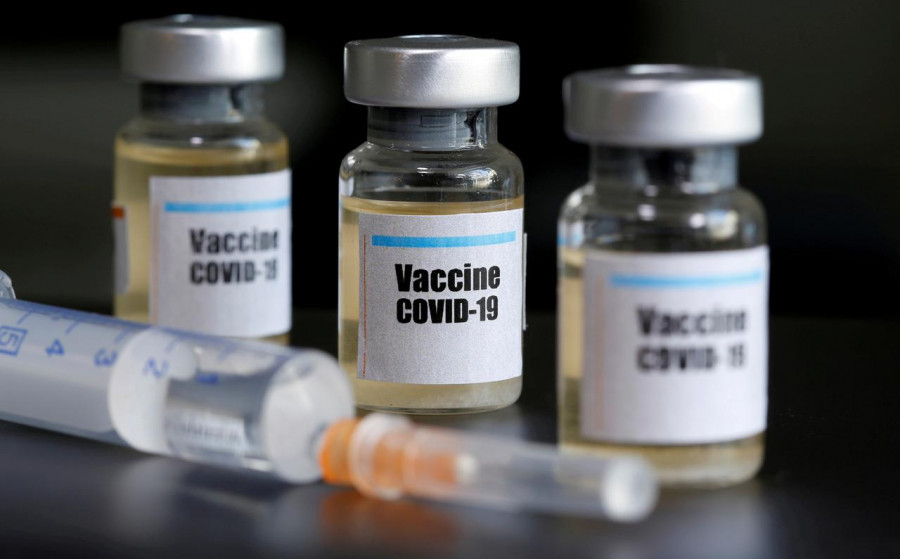Health
Nepal asks India to help procure 20 percent of vaccines
72 percent of Nepalis will be vaccinated. 20 percent through WHO may come as early after March of 2021, officials say.
Arjun Poudel
The Nepal government has written to the Indian government, requesting for procurement of Covid-19 vaccines to inoculate around 20 percent of the Nepali population.
The Indian government is procuring the jabs manufactured in its own country to vaccinate its people against Covid-19.
“To get the vaccines at the earliest, the government has requested the Indian government to buy vaccines for 20 percent Nepalis,” an official at the Health Ministry, told the Post, asking not to be named.
Nepal will pay for the vaccines it sources through the Indian government.
At least two vaccine candidates including Oxford’s AstraZeneca and domestically developed candidate Bharat Biotech’s vaccine are in the final stages of a third phase trial in India.
India is the world’s largest producer of vaccines.
Besides the India-made vaccines, the government is also pursuing vaccines made in other countries.
“Around 15 vaccine candidates of different countries and companies are in third phase trials,” Dr Shyam Raj Upreti, coordinator of Covid-19 Vaccine Advisory Committee, told the Post. “The government has written letters to most of the countries for help and to the individual companies to procure the vaccines.”
Last month the government sent diplomatic notes to India, China, Russia, the United Kingdom and the United States, countries whose vaccines against the coronavirus have either completed the third phase trials or are near their completion, for early availability in Nepal.
The government has estimated that vaccinating 52 percent of the population would cost Rs48 billion.
Of Nepal’s total population, those below 15 will not be vaccinated as vaccines being trialled have not been tested on people below this age.
Of the remaining 72 percent of the population, who are above 15 years, 20 percent will be vaccinated with jabs provided by the COVAX programme. COVAX is a collaboration, with more than two-thirds of the world engaged, that has the world’s largest and most diverse portfolio of potential Covid-19 vaccines. It is co-led by Gavi, the global vaccine alliance, and the World Health Organization.
According to Upreti, the World Health Organization has asked the government to prepare for rollout of Covid-19 vaccines under COVAX programmes in the second trimester of 2021.
Along with writing letters to the countries and companies manufacturing the vaccines, authorities are also doing necessary homeworks—cost assessment of vaccines, supply system, storage facilities and removing legal hurdles.
On November 18, President Bidya Devi Bhandari endorsed an ordinance to amend the Drug Act (1978) to facilitate the use of emergency medicines and vaccines for Covid-19 that have been tested and approved in other countries.
“Each individual needs two doses of vaccine and each dose is estimated to cost $10,” Upreti added.
The Rs48 billion estimation also includes costs of storage, supply costs and cost of vaccines set to be acquired under the COVAX programme.
The Health Ministry has estimated Rs4 billion for the vaccines under the COVAX programme—with US$2 two per dose of the vaccine and Rs2 billion for operating and management costs.
But, according to Dr Jhalak Sharma of the Child Health Section at the Family Welfare Division under the Department of Health Services, the government may not have to pay for COVAX vaccines and only bear its management costs.
A list of people who will be vaccinated on the basis of priority has also been prepared.
“We have also made a priority list for the coronavirus vaccines,” Sharma told the Post. “Health workers who are at high risk of getting infected and passing the infection are the first priority. If health workers get infected health services will be affected. Therefore all health workers serving either in state-run health facilities or in private centres are the first priority.”
Supporting staff—drivers, cleaning staff of health facilities, security personnel deployed on the front line and female community health volunteers are also among the first priority.
People above 55 years old are the second priority and those in the 40 t0 54 years range are third priority, according to Sharma.
People between 15 and 40 years of age are the last priority.
Despite all the efforts it is still not clear when and which vaccine will come to the country, according to Upreti, coordinator of Covid-19 Vaccine Advisory Committee.




 9.12°C Kathmandu
9.12°C Kathmandu














